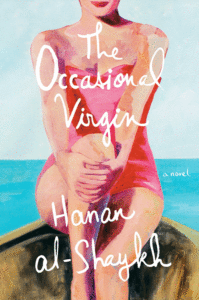Book Review: The Occasional Virgin
By Muneeza Shamsie | Bookmark | Published 7 years ago

Hanan Al-Shaykh is a celebrated Lebanese writer of Arabic fiction and her work has been lauded for its frank portrayal of women’s lives. Al-Shaykh grew up in a strict, religious Muslim family, but her childhood was marked by her parents’ untenable marriage: her mother was forcibly married at 14 to Al-Shaykh’s father, a widower with three sons, and entered into a clandestine relationship with another man and married him, after a divorce and great scandal. Her mother’s story would become the subject of Al-Shaykh’s memoir The Locust and the Bird (2009).
Hanan Al-Shaykh was educated in Beirut and Cairo, and in 1968 she defied her family to marry a Lebanese Christian. By 1975, she had published two novels and was working in Beirut as a journalist when the civil war broke out. She fled to London with her two children and has lived there since. Her many novels, translated into English, include The Story of Zahra (1980), Women of Sand and Myrhh (1989) and Only in London (2001). She has also written several plays, and in 2011 published a retelling of 13 stories in One Thousand and One Nights – a book which had spoken so directly to her since her childhood.
Her new novel, The Occasional Virgin, revolves around two friends of Lebanese origin, Yvonne and Huda, who belong to Christian and Muslim families respectively. Yvonne has settled in London and owns an advertising firm; Huda is a successful playwright in Toronto. But they are both aware that after 20 years of living abroad, they “aren’t completely at home with foreigners or in Lebanon.” Their friendship, which is but two years old, took root during a conference in Beirut where “they became each other’s lifebelts in a country which was beginning to be unfamiliar to them.”
The complex relationship between homeland and adopted land and the assertion of a multi-faith multiculturalism, informs the narrative, which also challenges stereotypes associated with identity and skin colour in the West: Yvonne is blonde and Huda dark-skinned, yet they both speak fluent English, Arabic and French, and belong to the same country. The novel is divided into two and the first section, ‘Two Young Women by The Sea’ tells of their holiday together to the scenic Italian Riviera. Here the pine trees and particularly the Mediterranean, remind them of Beirut, which brings with it both nostalgia and memories of childhood trauma.
Yvonne dashes into the water, negotiating rocks, seaweed and other obstacles with great skill. Huda prevaricates. She grew up in a strict Muslim family, the daughter of a religious figure, a stern shaykh. Their house, “empty of colour and pictures and music,” was in a part of town far from the sea. He is outraged to discover that she has been secretly accompanying other girls in her neighbourhood, albeit chaperoned by their aunts, to the seaside for a swim in a pool for women only. In her home, wearing a swimming suit as well as immersion in the sea, is a matter of great shame; the punishment for such transgressions (and for innocent childhood games and questions) is dire. Yvonne on the other hand, brought up near the sea, is taught to dive and swim from a young age, but in her home patriarchy reigns supreme: she discovers that she must never outshine her brothers, not even as a swimmer. She is brutally punished for doing so; and later criticised for having a more successful career than her brothers.
The civil war provides the catalyst for Yvonne and Huda to leave Beirut, albeit under very different circumstances. Their quest for empowerment and self in foreign lands has made them very different to the women they might have been had they remained in Beirut. Both are in their late thirties and unmarried. Their determination to defy their patriarchal upbringing and to be in control of their relationships with men has led to brief, disappointing liaisons. Huda has decided she will never marry; Yvonne wants to have children and is increasingly obsessed with the passage of time and the ticking of the biological clock.
The second section of the book, ‘The Isolated Virgin,’ takes place in London, where Huda stays with Yvonne while negotiating for a British stage version of her adaptation of A Thousand and One Nights, after its successful run in Toronto. Huda’s exploration of the city in Yvonne’s company, takes the two friends to Speaker’s Corner in Hyde Park, where the British, Bangladeshis, Arabs and others are engaged in delivering or listening to diverse speeches which lead to lively conversations, questions and arguments and also raise important issues of migration and identity – and different aspects of Muslim lives and their faith. Huda finds herself caught in a heated argument with a tall, young, dark-skinned Muslim man, Hisham, who expounds hard-line religious ideas that she disputes. The conversation takes an unpleasant turn and Huda decides to teach him a lesson — by using wile and guile to seduce him, play a joke on him, and show him up as a hypocrite. However, events take a somewhat unexpected turn — which neither she nor Yvonne can quite control.
The problem with The Isolated Virgin is that the treatment of religion is often self-conscious and the episode on Speaker’s Corner, in particular, is too heavy on polemics. On the other hand, the narrative does raise pertinent questions on the nature of exile and loss, and issues of individual freedoms, equality, identity and belonging.


